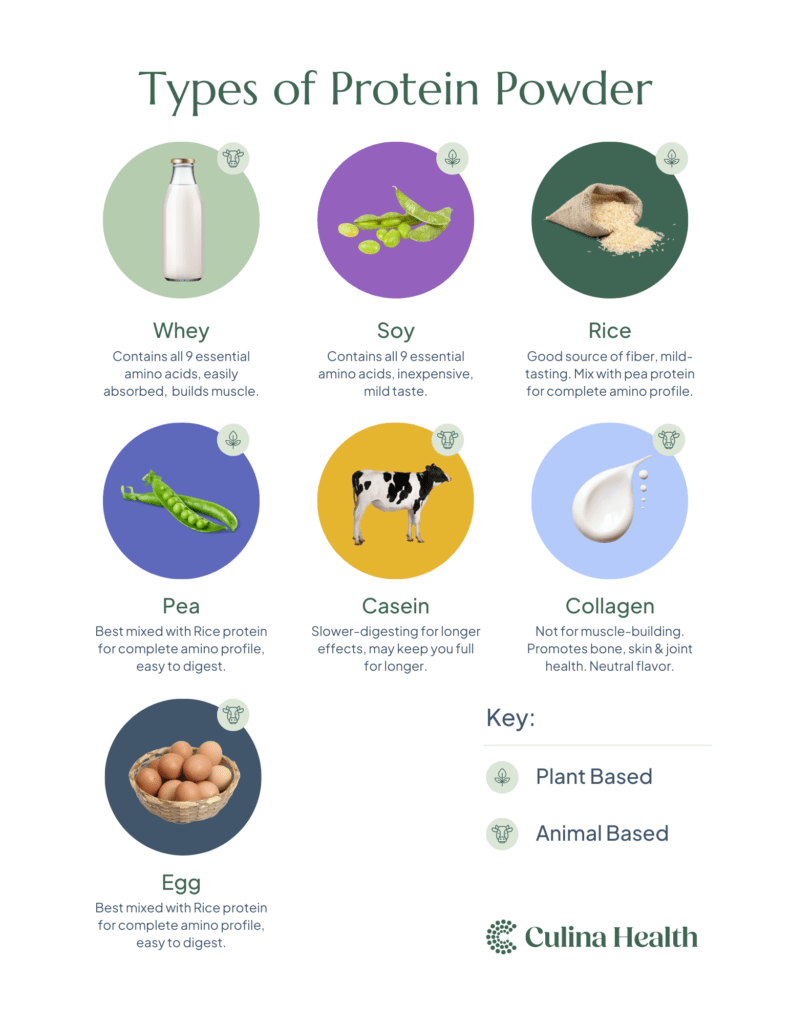Protein powders are now widely popular and you can find them everywhere—from pharmacies to supermarkets and gyms. If you’re curious about the hype surrounding protein powders and whether you should include them in your routine, you’re in the right place. We’ll dive into the world of protein powders, highlight their potential benefits, and provide key considerations to help you make informed choices.
- Protein powders can aid muscle recovery and reduce delayed onset muscle soreness after workouts.
- Supplementing protein may enhance snack satisfaction and nutritional content.
- Proper protein intake is critical for weight management and preserving muscle mass during weight loss.
- High-quality protein powders can support blood sugar management, especially for individuals with diabetes.
What Are The Benefits Of Protein Powder?
Protein is a macronutrient that serves as the building blocks for hormones and neurotransmitters. It plays a key role in maintaining, repairing, and building muscle, and it supports the health of our hair, skin, and gut. Protein needs can vary depending on factors like sex, age, and activity level.
Most people meet their protein requirements through a regular diet, with protein-rich foods such as eggs, poultry, fish, meat, and dairy products. However, some individuals may need extra protein, especially those with specific dietary needs or health conditions. For example, vegans and vegetarians might find it challenging to get enough protein from plant-based sources alone, making protein powders or protein shakes a helpful option.
Who May Need Extra Protein?
Pregnant women also have higher protein requirements to support the growth and development of a fetus. Furthermore, individuals recovering from surgery or postpartum or those experiencing significant unexplained weight loss and even athletes have increased nutrient needs, and a protein powder can assist in meeting those needs.
Protein needs vary depending on age, sex, weight, activity level, and health goals. Sedentary individuals generally need about 0.8 grams of protein per kilogram of body weight. Active individuals or those who exercise regularly may require 1.2 to 2.2 grams per kilogram. Menopausal women may benefit from consuming 1.0 to 1.2 grams per kilogram, while pregnant women are advised to aim for about 1.1 grams per kilogram of body weight.
If you generally eat enough protein from whole foods, then taking a protein powder may not be necessary. However, for the majority of people it isn’t harmful to include a protein powder every now and then for the following reasons:
- Supplementing with protein may improve muscle recovery as post workout fuel.
- Protein supplementation may help with lower incidence of delayed onset muscle soreness (DOMS).
- Adding a protein powder can increase the protein content and fullness factor of a snack (like a fruit smoothie).
- Collagen protein for hair, skin, nails and gut health support.
- Protein supplement to support digestion challenges or to provide nourishment when dealing with a low appetite.
What Are The Best Protein Powders?
It’s important to recognize that the quality of protein powders can differ. Not all protein powders provide the complete set of 9 essential amino acids (EAAs). Complete proteins, which have a high biological value, contain all 9 EAAs that the body needs to support essential functions. While animal-based proteins typically offer complete proteins, many plant-based options are incomplete, as they may lack one or more of the EAAs.
Whey Protein: A Complete and Popular Choice
Whey protein is often considered an excellent choice for supplementation because it contains all 9 essential amino acids (EAAs). It comes from milk as a by-product of cheese production. One of its key benefits is high digestibility, making it easier for the body to absorb and use compared to other protein sources.
Whey protein is especially helpful for individuals looking to gain weight, build muscle, or meet their protein and calorie needs when food alone isn’t enough. When combined with a calorie surplus and strength training, whey protein can support muscle growth. It is rich in branched-chain amino acids (BCAAs) like leucine, which play a key role in muscle repair and growth. However, it’s important to remember that consuming extra protein alone won’t lead to muscle gain without proper strength training and sufficient calorie intake.
Whey protein brands we love include: Naked Whey, Bad Athletics, Ascent, and Simply Tera’s.
Plant Based Protein: Soy, Rice, and Pea Protein
Soy protein stands out among vegetarian protein powders because it is a complete protein, containing all nine essential amino acids (EAAs). However, amino acid content can vary among plant-based proteins. To create a balanced, high-quality protein blend, it’s often helpful to combine different plant protein sources.
For example, blending pea and rice proteins can be beneficial. They complement each other by filling in any amino acids that might be missing from one source. This approach helps ensure a well-rounded protein profile, especially for individuals following a vegetarian diet. However, always choose what works best for you.
If you prefer whey protein, opt for a plain, 100% whey protein powder without added sugars, artificial sweeteners, or unnecessary additives. This will give you the highest quality product. Similarly, when choosing vegetarian protein powders, look for options with minimal additives and a complete amino acid profile to get the most out of your choice.
Plant-based protein powder brands we love include: Tejari, Ka’Chava, and Vital Proteins.
Other Protein Powder Options: Casein, Collagen, and Egg
Other popular protein powders include casein, collagen and egg protein. Casein is another protein derived from milk. It is slower-digesting compared to whey protein, providing a sustained release of amino acids over a longer period of time. Collagen protein powder is derived from animal sources and provides specific amino acids that are often used for its potential benefits to hair, skin, and nail health. Egg protein powder is derived from egg whites and is a complete protein source. It is an option for individuals with dairy or soy allergies.
Choosing the best protein powder depends on your unique needs and preferences. Factors like taste, texture, ingredient quality, and allergens play a key role. Consulting with healthcare professionals or a registered dietitian can help you find a protein powder that matches your health goals. It’s also important to read product labels carefully. Exploring third-party testing can offer additional insight, ensuring you select a high-quality product that fits your needs.
Other protein powder brands we love include: Transparent Labs, Genius, and BUBS Naturals.

Protein Powders for Weight Loss
If your goal is to lose or maintain weight, prioritizing protein as a macronutrient is crucial. Protein has unique properties that make it beneficial for weight management. One of these benefits is its ability to prolong the suppression of the hunger hormone ghrelin more effectively compared to other macronutrients like carbohydrates or fats. When you consume protein as part of a balanced meal, it helps you feel full and satisfied for a longer duration. This feeling of satiety can support weight loss efforts.
In addition to curbing appetite, consuming enough protein is important when losing weight to prevent muscle loss. Protein provides the building blocks needed to maintain muscle mass, which is essential for a healthy metabolism. Muscle tissue is more metabolically active than fat tissue, meaning it burns more calories even at rest. Preserving muscle mass helps keep your metabolism functioning well supporting personal weight loss goals.
Protein also has a higher thermic effect of food compared to carbs and fats, meaning your body burns more calories to process and use protein. This can slightly increase your metabolic rate and support weight management. Protein powders help you feel fuller, preserve muscle mass, and increase calorie expenditure, aiding in weight management goals.
Using Protein Powders for Blood Sugar Management
Including protein in your meals can positively affect blood sugar control, especially if you’re focused on managing your levels. Protein helps stabilize blood glucose by slowing the absorption of carbohydrates. This process prevents sharp spikes and drops in blood sugar. Adding protein to your meals can help keep blood sugar levels more consistent throughout the day.
Many research studies, including one published in BMJ Open Diabetes Research and Care, have explored the effects of whey protein on blood sugar management. This is especially relevant for individuals with diabetes. One way whey protein may help control blood sugar is by slowing gastric emptying. This slows the digestion and absorption of nutrients, including carbohydrates. As a result, glucose enters the bloodstream more gradually, helping to avoid sharp blood sugar increases after meals.
Consuming whey protein before a meal can also stimulate insulin release. Insulin helps transport glucose into cells for energy or storage. This can lead to lower post-meal blood sugar levels. However, the effects of protein on blood sugar control can vary from person to person. Factors such as the amount and timing of protein intake, as well as individual metabolic responses, all play a role in these effects.
Side Effects of Whey And Who Shouldn’t Take It
Whey protein may not be suitable for individuals with a dairy allergy or lactose sensitivity. For some people, it may cause acne flare-ups. Flavored whey protein powders with artificial sweeteners can also cause gastrointestinal side effects if consumed in large amounts. It’s important to consider individual allergies, sensitivities, and preferences when deciding whether to consume whey protein.
Final Thoughts on Protein Powder
Protein powders offer a convenient and effective way to supplement protein intake, especially for individuals with specific dietary needs or health conditions. They support muscle growth, aid in weight management, help meet increased protein requirements, and assist in controlling blood sugar levels. However, it’s important to choose high-quality protein powders, consider any allergies or sensitivities, and consult a healthcare professional or registered dietitian to determine the best type and dosage for your needs. While helpful, protein powders should complement a well-balanced diet and not replace whole food sources of protein.It’s important to recognize that individual protein needs can vary significantly from person to person. Factors like age, sex, weight, activity level, health conditions, and specific goals all play a role in determining optimal protein intake and nutrition needs. A registered dietitian can assess your unique circumstances, consider any dietary restrictions or health concerns, and provide tailored recommendations for your protein intake.






